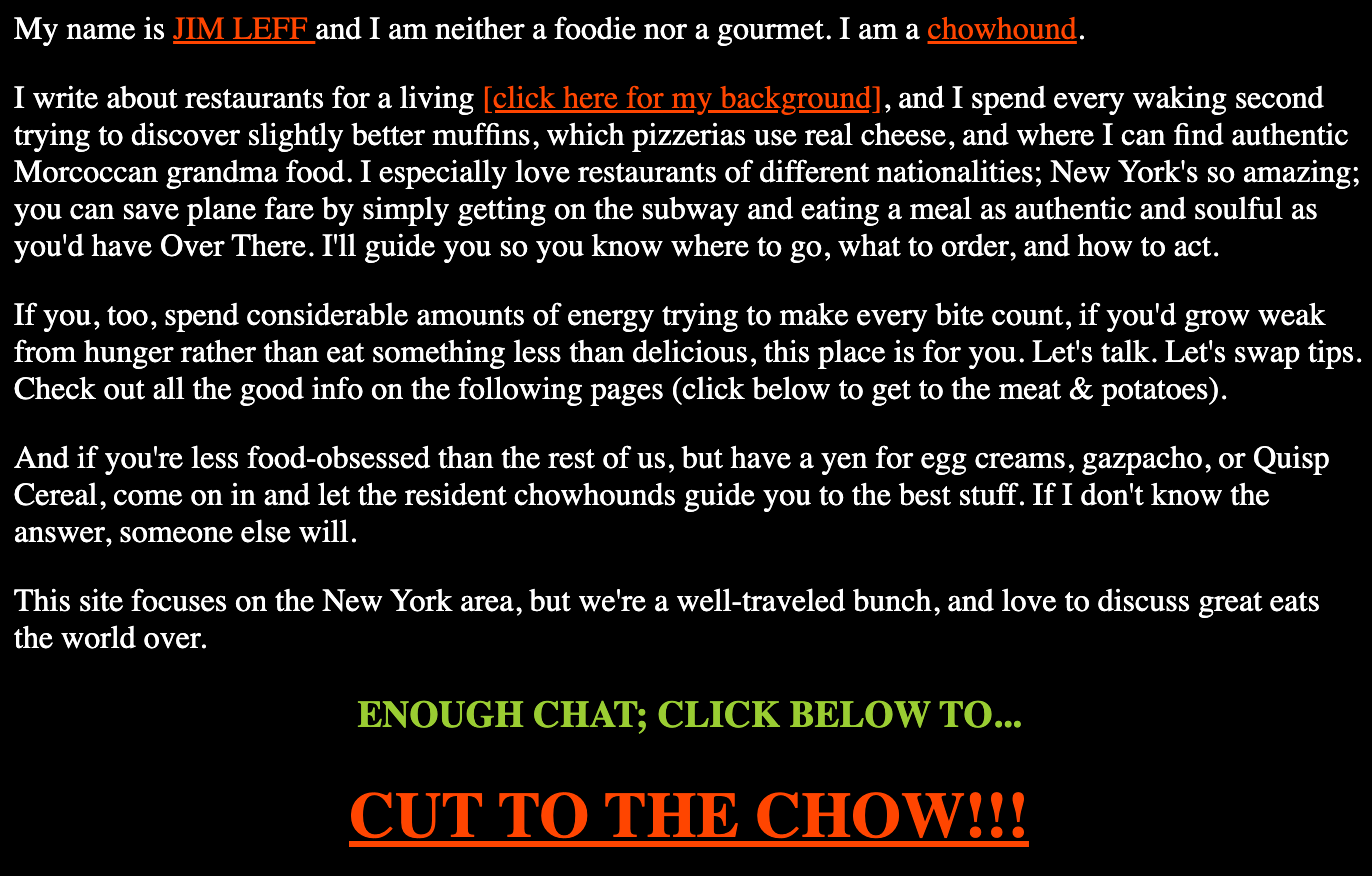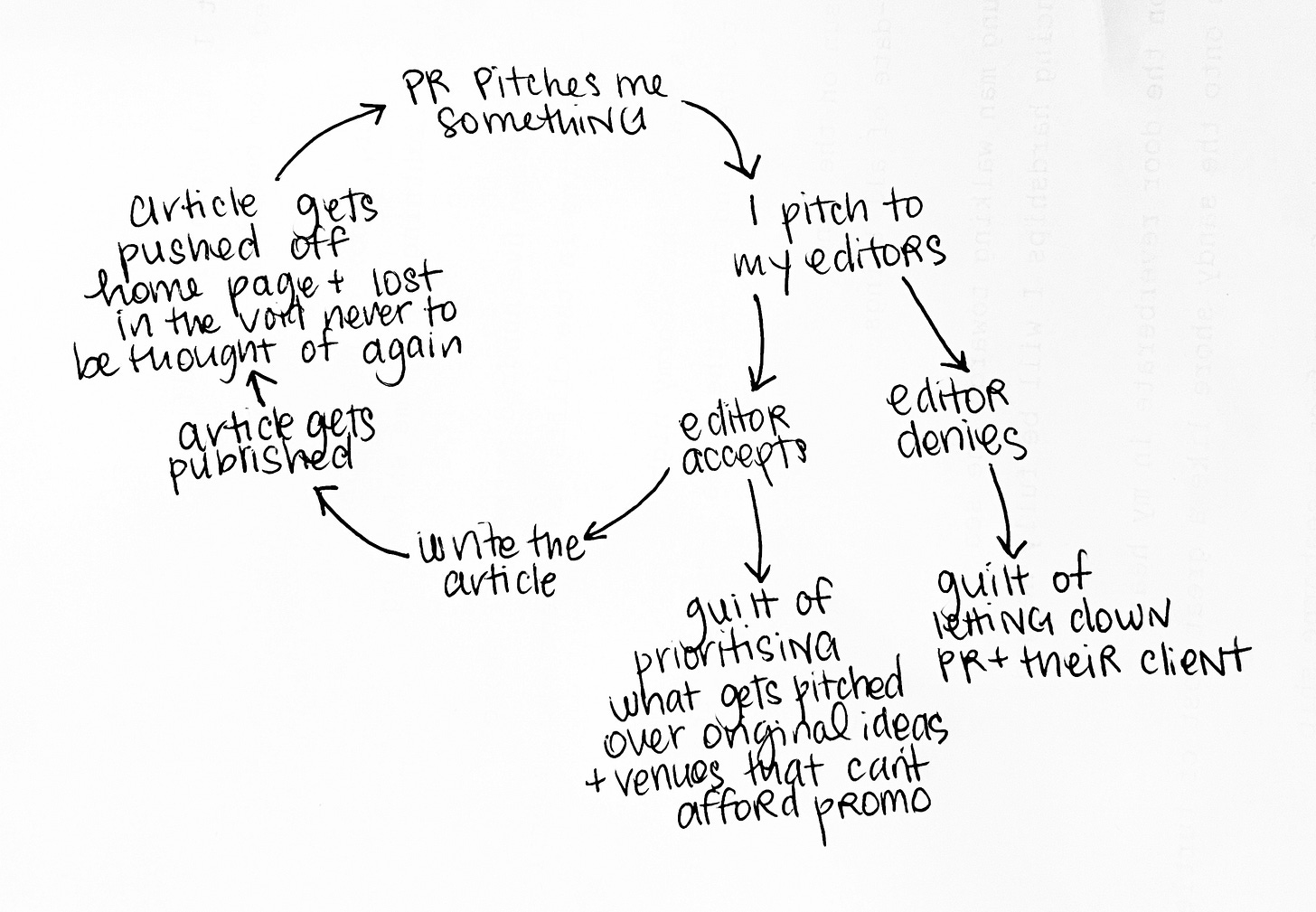sorry to harp on about the US1 all the time but I’m from there and it informs most of my formative (and current) media intake. and I’m assuming yours too because we invented that shit
a brief history
just kidding, ancient romans invented the daily gazette – a roundup of news and events and local gossip, chiselled into stone or metal – in 59 BC. then way later came handwritten papers, also invented in italy, and finally print papers (thanks, gutenberg), first published in germany in 1609
BUT we can claim some credit as the first digitally published document was created in my country of origin in 1971 by a university of illinois student. then the internet boomed and we launched the first-ever digital magazine, hotwired (a subbrand of wired and all-around underrated/apt name) in 1994, year of my birth / the dog
people quickly realised this whole new world of online media was a great place to come together through food, triggering a whole slew of culinary sites and blogs, some of which would disappear into the ether and others of which would turn into the legacy media we know today
which was great timing for me to grow up mostly on the internet, start my own food and recipe blog at an age and period in time where I not self-aware enough not to, and ultimately end up making food writing my career, kind of
the current landscape
the australian food media landscape is made up of four main categories:
big print pubs with a digital presence: gourmet traveller, good food, etc.
big digital pubs that mayyy have a print presence: broadsheet, time out, etc.
solo-run sites and blogs: the citylane, the world loves melbourne, etc.
the others: “new media” - content creators, mostly, who have been collectively othered for years by the most old and conservative (cough, cough) of the media but are now breaking through and finding their own place
so where does that leave me
I’ve been feeling ungrounded in this space for some time but it came to a head as I watched the whole shewry vs. the age debate unfold (and even reach the UK) and realised how silly it all is and that while storytelling through food is VERY important, the pillars that uphold our current landscape are not – even if we’ve collectively deemed them to be in an emperor’s new clothes sort of way
I’ve always toed the line between food journalism and “the others” – one foot in media and content (which is distinct but crosses over) and several toes in marketing/pr and a few fingers in birkis-on-the-ground-service – kind of all and kind of none at the same time
and while I don’t take the criticism towards food writers personally, I do question where it leaves me as someone who sort of stumbled into the role
I recently interviewed ben for an article that’s yet to [may never] will not be published (the editor pulled the plug b/c sensitivities). as to be expected from a smart man with a popular platform, he made some valid points. and as to be expected, he also made several I disagree with. like that criticism does more harm than good (depends) and that critics have no place to critique unless they’re as committed, trained and experienced in their craft as he (vague but would definitely likely exclude me)2
what we do share is the belief that food writers wield great power and privilege and failure to recognise that can be destructive. and that there’s flaw in the fact that australia’s leading food writers have historically been white (although, ahem, so have their most lauded chefs)
I get why (some) hospo hates (some) food writers
who the fuck do they think they are showing up to restaurants expecting special treatment, eating for free, throwing around words that can make or break a business?
what the hell do they think they know as someone who has (likely) not put in the hard work of a chef to understand the art of cooking?
what gives them the right to judge something they’re tasting for the first time, may know very little about, or is not made for them?
and in many ways, I welcome it. criticism makes the critics better, more self-aware, more well-rounded, more discerning. restaurants bending over backwards to kiss our feet isn’t the answer. but if anything, we need more room to speak freely, not less
food is political; the industry has a history of circumventing this. hospitality is historically hostile; the industry has a history of circumventing this. having safe spaces to share our genuine, impartial experiences – not to stories of abuse and misconduct and sometimes just bad vibes that you can’t quite place your finger on and could never publish without due evidence – is sacred. but interpretation, like taste, is subjective
so where does that leave us?
the truth is that I’m floundering because media feels like a sinking ship and nothing I write feels quite right and true except for what I can put on here with no boundaries or edits except for my own and the restaurant landscape moves so fast I can barely keep up and sometimes I ask myself what the hell is the point of it all except contributing to a PR-driven media cycle that gives me endless anxiety? so i’d like to ask you…
what do you look for in a publication (and specifically a food publication)? and, perhaps more importantly, what do you expect from your food writers?
is it honest reviews? tips on where to dine? cooking advice? exposés or historical deep-dives or trend tracking or profiles?
do you want your writers to educate you? do you expect them to? do you believe they hold a responsibility to be sensitive, accurate, just, critical but in the right ways? but also track trends and get clicks and know whether a piece on the virality of two-toned drinks is a try-hard attempt to jump on the bandwagon too late or a timely snapshot of a cultural moment?
now taking tips / feedback / suggestions here. I understand it’s an effort to share your thoughts for free but I see it as a way to contribute to a better future of journalism so any input is hugely appreciated <3
on that note, the content strategy may change a bit around here so stay tuned and speak to you soon
the hill i’ll die on is that the us / the states or perhaps ‘merica are the only acceptable terms when referencing the good ol’ usa. the far more popular “america” is incorrect as it fails to recognise canada and mexico which are part of the same damn content and central and south america, which also make up the “americas”. never forget
I’m paraphrasing so don’t come after me, ben. though I think he’d agree good food writing means healthy discourse








